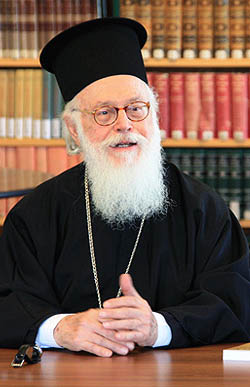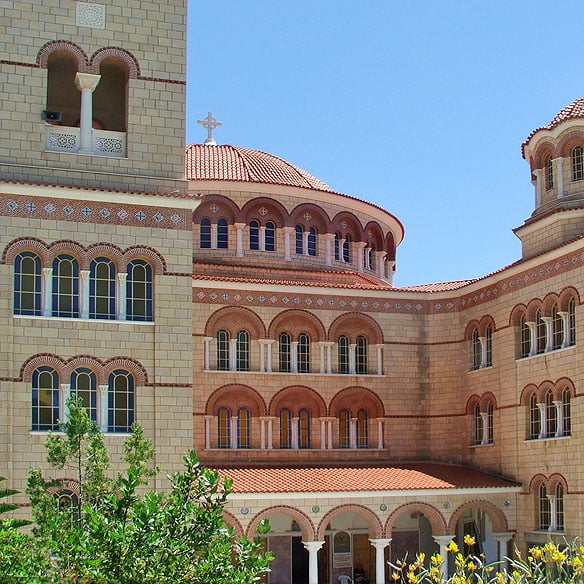The Critical Discourse of the Church – 4
4 September 2015
Archbishop Anastasios of Albania
After its critical discourse and its emphasis on personal responsibility, the Church has a duty to offer a message of optimism and hope. The crisis could prove to be a special opportunity to strengthen social solidarity, a chance for spiritual renewal. I’m optimistic about this. Hope is provided not just by the reserves of hydrocarbons which the Lord has given us and which lie hidden under the substrata of the land of Greece. What is probably more important are the spiritual reserves, which are the DNA of our cultural traits: yearning for justice and freedom; faith in the God of our fathers; self-sacrifice; empathy; mutual support; daring, in tragic circumstances, to hope and to create. Bolstered by the profound certainty of our faith in Him Who is the Creator and Lord of the universe. ‘The Lord Almighty Who is and was and will be’. As I often say, we Christians dare to hope because it needs courage to hope these days. There’s hope in our common struggle to transcend creation, so long as we remain firm in the obligation to show solidarity. All authority in heaven and on earth has been given to Him Who is truth, justice and love. If we stay with this, we dare to hope.
Finally, I would like to underline the fact that the progress of a society depends on the extent to which mere interdependence evolves into conscious mutual support. Interdependence has elements of coercion. Mutual support is essentially an act of freedom. It’s a continuous progress towards freedom, from our own small ego or from the overall ego, the collective ego, to which we often have recourse. A movement of escape, towards an encounter with the Other, towards the execution of a bounden duty of support for our fellow human beings, who are images of God. Of solidarity with the local society, the national, the regional and, in the end, the global.

I’ll end with an allegorical picture. I don’t know how many of you have ever been to Palestine, but you’ll all remember that there are two lakes there: the Sea of Galilee and the Dead Sea. These lakes have both a common feature and a basic difference. Both of them are fed by the River Jordan. The first, the Sea of Galilee is fed by the waters and thereafter allows them to flow out to the south, outside it, and thus they irrigate two regions. The second, the Dead Sea, keeps the waters for itself. I remember that, more than sixty years ago I went there for the first time and I still recall the bitter taste after I put my finger in. In and around the Sea of Galilee there’s abundant life, whereas in the second there’s no trace of life. And we know that Christ had nothing to do with the Dead Sea. He began His public ministry from Galilee and He performed many of His miracles in the area. We Christians have the privilege of continually being fed with the water of life, from the spiritual Jordan of faith. All the time, we receive incomparable gifts, both material and spiritual. If we keep them for ourselves alone, we’ll lose them. The Dead Sea shows symbolically what it means if people keep what they receive for themselves alone. To receive and to give is the secret to having a full life. I pray with my whole heart that the network of social support and relief already belongs to this category and continually sends out this hope and love. I conclude and repeat: to receive and to give is the secret to having a full life.
Thank you very much.






